Singapore is renowned for its vibrant food culture, offering a diverse array of cuisines that cater to all dietary requirements, from meat lovers to vegetarians. If you’re looking to up your protein intake, whether for muscle recovery, weight management, or overall health, this guide offers you a complete overview of high-protein food options in Singapore, from hawker center delights to grocery store staples.
Why is Protein Important?
Protein is an essential macronutrient that serves as the building block for muscles, tissues, and organs. It aids in the production of enzymes and hormones, facilitates muscle recovery, and supports cognitive and mental health. For individuals engaged in fitness, bodybuilding, or high-intensity activities, protein is particularly crucial for muscle growth and repair.
How Much Protein Do We Need?
The dietary guidelines suggest that the amount of protein required varies depending on several factors, including age, sex, physical activity level, and overall health condition. The average adult requires approximately 0.8 grams of protein per kilogram of body weight per day, according to the Recommended Dietary Allowance (RDA). However, this amount may increase for individuals engaged in regular physical activity or those with specific health conditions. For instance, athletes and individuals following a gym diet or involved in bodybuilding may require more protein to support muscle recovery and growth. Similarly, older adults may need more protein to maintain muscle mass and strength, as the ability to synthesize protein decreases with age. Pregnant and breastfeeding women also require additional protein to support the growth and development of the fetus and milk production. It is important to note that while consuming adequate protein is essential, excessive intake can lead to health problems, including kidney damage and increased risk of certain diseases. Therefore, it is recommended to maintain a balanced diet, incorporating a variety of protein sources, to meet the nutritional needs without exceeding the recommended intake.
How to get adequate intake of protein
1. Know Your Daily Protein Needs
For average Singaporean adults aged 18-49, the recommended daily protein intake is approximately 0.8g/kg body weight. Meanwhile, older adults aged 50 and above have a higher daily recommended protein intake at 1.2g/kg bodyweight instead. On average, adults aged 18-49 should consume approximately 50g to 60g of protein a day.1
The above info can be tabulated for ease of reference:
| Age Range | Protein requirement in g/kg of body weight |
| 18 — 49 | 0.8 |
| 50 & up | 1.2 |
So, for an individual who is aged between 18 – 49 and weighs 60kg, the daily requirement of protein is approximately 0.8 x 60 = 48g.
2. Incorporate Protein-rich Foods into Your Meals
Spreading this number across 3 meals means around 20g of protein per meal — think 1 square piece of pan-fried taukwa or a palm-sized chicken breast. These are common foods we have during our meals, which means that consuming 20g of protein per meal is a lot more achievable than you may think!
Here are some other examples of foods containing approximately 20-25g protein which you could consider for each meal:
There’s no need to stick to only one food for your protein source each time— feel free to mix and match these foods for a delicious and nutritious meal such as having one glass of low fat-milk with 2 eggs for breakfast. Remember, have a mixture of animal- and plant-based proteins as part of a balanced diet, and choose fresh, lean meat instead of processed, preserved and fatty meat!
Here are some ways you can easily tweak your usual meals to incorporate some protein:
- Have eggs with your butter kaya toast or swap butter/jam to peanut butter spread for your toast.
- Swap out water/condensed milk for low-fat milk/soymilk when you have your oats
- Add an egg to your fried rice, or make sure you have at least one fish/chicken/tofu/egg option when you order economic rice or nasi padang
- Replace your chocolates or chips with low-fat yogurt or mixed nuts during snack time
- Instead of fried noodles for lunch, consider ordering sliced fish bee hoon, fish ball noodle soup, or noodles with yong tau fu.
- Replace coconut milk with low-fat milk or yogurt when you cook curry dishes.
Protein-rich food can easily be found around us! 1 palm-sized beef steak (100g) contains 32g of protein content. A handful of walnuts (approximately 30g) would give you 4g of protein.
Here are some other examples of protein-rich foods which you can add to your meal to meet your daily protein need:
| Food item | Protein content (g) |
| 1 palm size of beef steak (100g) | 32 |
| a handful of walnuts (~13 halves) (30g) | 4 |
| a handful of mixed nuts (30g) | 5 |
| 1 cup of low-fat plain yoghurt (150g) | 5 |
| 1 small piece of tempeh (30g) | 6 |
| 1 slice of reduced-fat cheddar cheese (20g) | 6 |
| a handful of almond nuts (~23 pieces) (30g) | 6 |
| 1 tablespoon of peanut butter spread (25g) | 7 |
| 1 bowl of soybean curd (300g) | 7 |
| 1 egg (50g) | 7 |
| 1 dessert-bowl of green bean soup (250g) | 8 |
| 1 glass/cup of low fat milk (250ml) | 9 |
| 1 dessert-bowl of red bean soup (250g) | 10 |
| 1 glass/cup of soybean milk (250ml) | 11 |
| 1 small bowl of dhal curry (200g) | 13 |
| 1 square piece of pan-fried taukwa (150g) | 20 |
| 1 fried fish (e.g. tengerri batang/mackerel/kembong) (~100g) | 20 |
| Half a can of canned tuna in brine (100g) | 22 |
| 2 pieces of canned sardines (150g) | 23 |
| 1 palm size of salmon (100g) | 24 |
| 1 palm size of chicken breast (100g) | 29 |
| 1 fried fish (e.g. tengerri batang/mackerel/kembong) (~100g) | 20 |
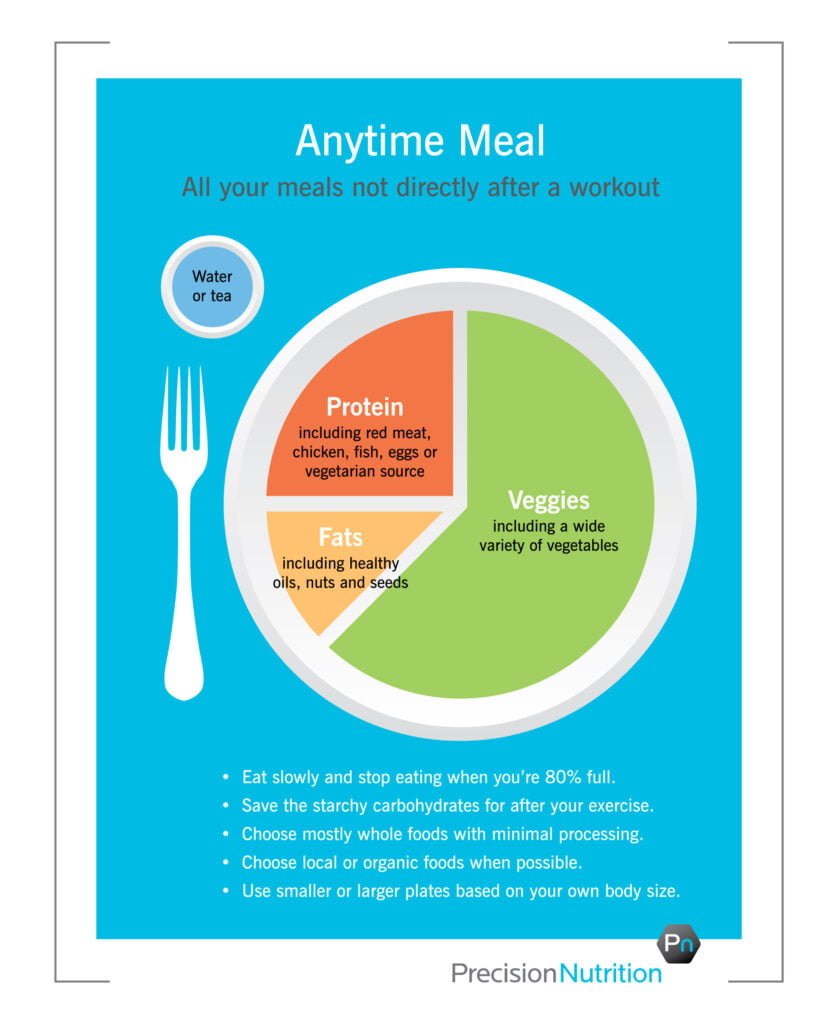
3. Remember to get enough proteins!
Now that you’re familiar with proteins and their benefits, remember to have protein at every meal. A little goes a long way – a glass of soybean milk at breakfast, a handful of almonds instead of potato chips. These efforts add up!
Ensuring that you consume sufficient protein is only part of what constitutes a well-balanced meal — make sure that your other nutritional needs are met as well! How? Check out Anytime Plate’s visual guide for well-balanced meals to attain optimal health.
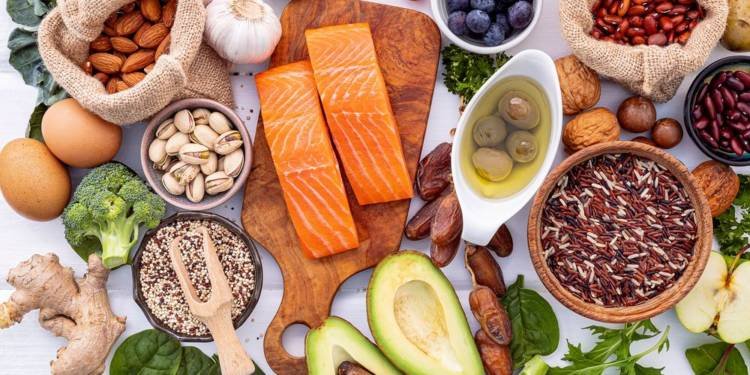
Exploring High Protein Foods in Local Markets
When it comes to high-protein recipes, local markets are an excellent source of fresh and natural ingredients. These markets offer a wide variety of protein-rich meals, catering to diverse dietary guidelines. Fresh seafood, lean meats, dairy products, and legumes are just a few examples of the high-protein foods you can find. Understanding the nutritional value of these items is key to incorporating them into your fitness diet or gym diet. Local markets in Singapore are particularly known for their wide variety of fresh produce. From fresh fish, an excellent source of lean protein and essential omega-3 fatty acids, to lean meats like chicken and turkey, these markets offer high-quality proteins. Dairy products such as milk, cheese, and yogurt, rich in protein and calcium, are also readily available. Legumes, including beans, lentils, and peas, provide not only high protein but also dietary fiber and other essential nutrients, making them a staple in any bodybuilding food regimen. Prepared foods are another highlight of local markets. These can range from grilled meats and fish to protein-rich salads and soups. These high-protein recipes provide a convenient option for those seeking protein-rich meals without the need for cooking. However, it’s important to ensure these foods are prepared with minimal added fats or sugars, as these can affect the nutritional benefits of the high protein content.
Natural Protein Sources
Natural protein sources, including both animal and plant-based proteins, are an integral part of any fitness diet or gym diet. These foods contain protein in its original form, without any artificial additives or enhancements, making them an excellent choice for a balanced diet. Whether you’re looking for animal-based proteins such as meat, fish, eggs, and dairy products, or plant-based proteins like legumes, nuts, and seeds, these natural protein sources are packed with essential nutrients. Animal-based proteins are complete proteins, meaning they contain all nine essential amino acids that the body cannot produce on its own. These proteins are easily absorbed and utilized by the body, making them a perfect choice for muscle growth and repair. This makes them a key component of any bodybuilding food regimen. However, it’s important to choose lean cuts of meat and low-fat dairy products to minimize saturated fat intake. Plant-based proteins, on the other hand, are typically low in one or more essential amino acids. However, by combining different plant-based proteins, one can obtain a complete protein profile. For example, combining legumes with grains can provide all nine essential amino acids. In addition to protein, plant-based proteins are also high in dietary fiber, antioxidants, and other beneficial nutrients.
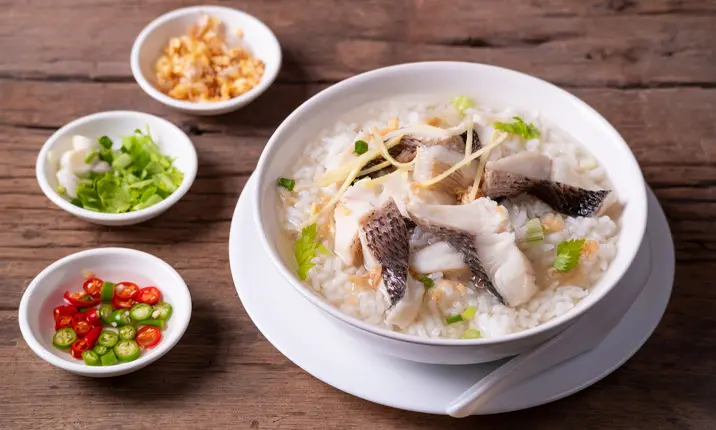
High-Protein Foods Found in Local Markets
While hawker stalls are convenient, local markets offer a plethora of fresh, natural protein sources that you can incorporate into home-cooked meals or meal prep for a fitness diet.
Animal-Based Proteins
Chicken Breast
- Protein: 31g per 100g
- Affordable and versatile, it’s perfect for grilling, roasting, or stir-frying.
Eggs
- Protein: 6-7g per egg
- An inexpensive, complete protein that’s perfect for breakfast, snacks, or as a meal topping.
Fish and Seafood
- Examples: Salmon (24g per 100g), mackerel (20g per 100g)
- Fresh seafood at local wet markets provides lean protein and omega-3 fatty acids.
Lean Beef
- Protein: 22-25g per 100g
- Opt for lean cuts like sirloin or tenderloin to reduce fat intake.
Milk and Low-Fat Dairy Products
- Protein: 9g per 250ml of low-fat milk, Greek yogurt (20g per cup)
- Dairy products are excellent sources of protein and calcium.
Plant-Based Proteins
Tofu and Tempeh
- Protein: 20g per 150g of taukwa (firm tofu), 19g per 100g of tempeh
- Widely available and affordable, these soy products are staples in vegetarian diets.
Legumes (Chickpeas, Lentils, Black Beans)
- Protein: 15g per cup of cooked chickpeas, 18g per cup of lentils
- Great for soups, stews, and salads, and rich in fiber.
Nuts and Seeds
- Protein: Almonds (6g per 30g), sunflower seeds (5g per 30g)
- Perfect as snacks or toppings for salads and yogurt.
Whole Grains (Quinoa, Brown Rice)
- Protein: Quinoa (8g per cup cooked)
- Combine grains with legumes for a complete protein profile.
Soy Milk and Soybean Curd
- Protein: 9-11g per cup of soy milk, 7g per bowl of soybean curd
- Excellent dairy-free protein options.
Healthier Cooking and Ordering Tips
Whether dining out or cooking at home, how your food is prepared can make a big difference in its nutritional value. Here are some tips:
- Grill, steam, or roast instead of frying.
- Choose lean cuts of meat and low-fat dairy products.
- Add eggs, tofu, or legumes to dishes like fried rice or noodles.
- Replace coconut milk with low-fat milk or yogurt in curries.
- Snack on nuts, seeds, or low-fat yogurt instead of chips or sugary treats.
Affordable High-Protein Meals in Singapore
If you’re on a budget, try these cost-effective protein-rich options:
- Half-can of canned tuna (100g): 22g protein
- 1 boiled egg (50g): 6g protein
- 1 piece of pan-fried taukwa (150g): 20g protein
- 1 bowl of dhal curry (200g): 13g protein
- 1 glass of soy milk (250ml): 11g protein

High Protein Hawker Foods
Singaporean cuisine is known for its hawker foods, or street foods. While often perceived as unhealthy due to their high fat and sodium content, many hawker foods can be incorporated into a fitness diet or gym diet as they are high in protein. Grilled chicken skewers, beef satay, and fish balls are all high-protein recipes that can be found in hawker centers. Tofu-based dishes are an excellent source of plant-based protein, making them a great addition to any bodybuilding food regimen. Legume-based dishes, such as chickpea falafel or lentil dahl, are also high in protein and packed with dietary fiber and other essential nutrients. These protein-rich meals are a staple of Singaporean cuisine. In conclusion, while hawker foods are often associated with unhealthy eating, there are many high protein options available. By making informed choices and being mindful of portion sizes, one can enjoy the convenience and flavor of hawker foods while also meeting their protein needs. This makes food delivery services in Singapore a great option for those looking for healthy food in Singapore.
Top High-Protein Hawker Foods in Singapore
Hawker centers are a cornerstone of Singaporean cuisine, and many dishes can be modified or selected to meet high-protein dietary needs. RAW Active highlights these hawker favorites that are both delicious and packed with protein:
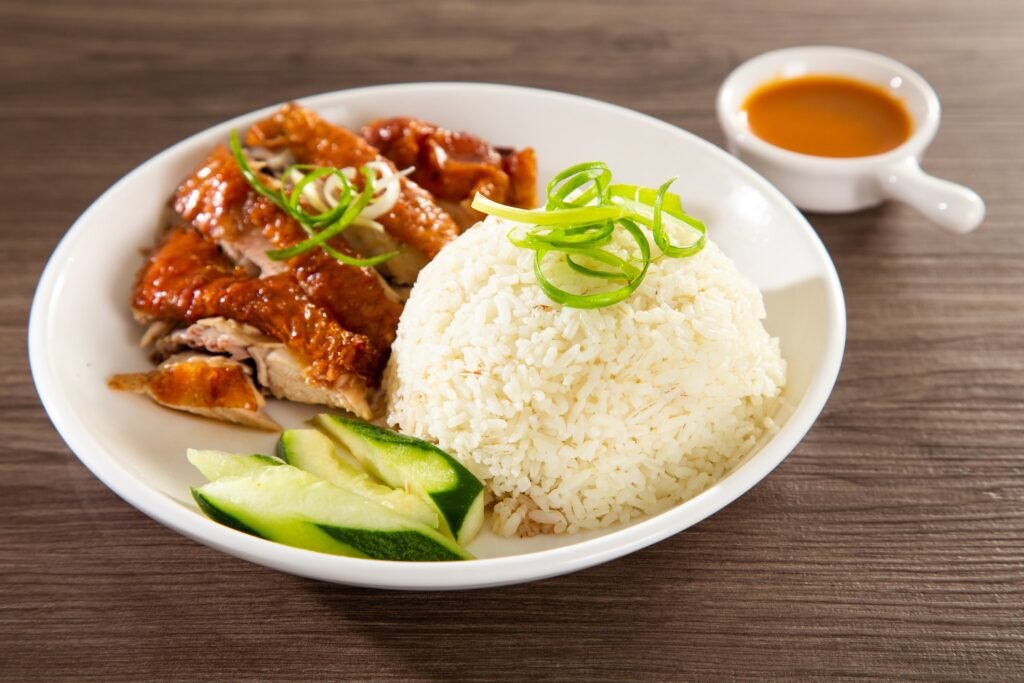
Hainanese Chicken Rice
- Protein: Lean chicken breast offers 29g per 100g.
- Tip: Ask for less rice and more chicken to reduce carbs and boost protein intake.
Bak Kut Teh
- Protein: The pork ribs in this comforting soup provide 20-25g of protein per serving.
- Bonus: The soup itself contains trace amounts of collagen and amino acids.
Fishball Noodles (Dry or Soup)
- Protein: Fishballs contribute 15-20g of protein per serving, depending on portion size.
- Tip: Choose soup versions for a lighter, lower-calorie meal.
Grilled Chicken Satay
- Protein: Each skewer contains approximately 7-9g of protein.
- Tip: Go easy on the peanut sauce to avoid excessive calories.
Yong Tau Foo
- Protein: Tofu, fish paste, and other add-ons can provide 15-20g of protein per bowl.
- Tip: Load up on tofu and egg-based items for extra protein.
Thunder Tea Rice
- Protein: This vegetarian-friendly dish combines tofu, peanuts, and green tea soup for 15-18g of protein per serving.
- Tip: Add extra tofu or a boiled egg for more protein.
Sliced Fish Soup
- Protein: Lean fish fillets offer 20g of protein per 100g.
- Tip: Skip the fried fish version and opt for the clear broth for a healthier meal.
Beef Hor Fun
- Protein: A plate of beef hor fun contains 25-30g of protein, thanks to the lean beef slices.
- Tip: Request less oil and more vegetables to balance the meal.
Egg-Drenched Fried Rice
- Protein: Eggs and chicken or shrimp can contribute 20-25g of protein per plate.
- Tip: Ask for extra eggs to amp up the protein content.
Nasi Padang (Economic Rice)
- Protein: Choose lean protein options like grilled chicken, fish, or boiled eggs for 15-30g of protein, depending on portion sizes.
- Tip: Avoid fried and coconut-based dishes to keep your meal cleaner.
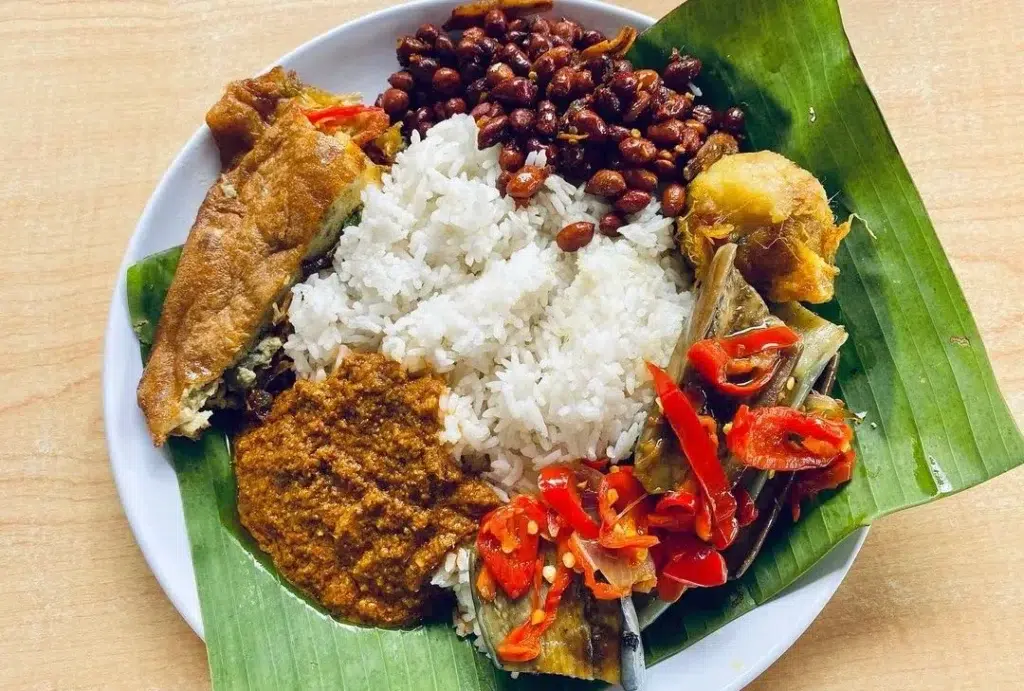
Affordable High-Protein Meals in Orchard Road
If you’re looking for affordable high-protein food options near Orchard Road, you’re in luck as the area is packed with eateries and hawker centers offering budget-friendly, protein-rich meals. Here are some great options:
1. Newton Food Centre
Located just a short distance from Orchard Road, Newton Food Centre is a hawker gem with plenty of high-protein options.
Grilled Chicken Satay
- Each skewer contains ~7-9g of protein.
- Affordable and delicious, ask for less peanut sauce to keep it healthier.
- Stall Recommendation: TKR Satay.
BBQ Stingray or Grilled Fish
- Fish is an excellent lean protein source (~20g per 100g).
- Opt for sambal on the side for less oil and sodium.
Bak Kut Teh
- Protein-packed pork rib soup (~20-25g protein/serving).
- Light yet filling, and perfect post-workout.
2. Food Republic @ Wisma Atria
A food court located directly on Orchard Road, offering a mix of hawker classics and modern dishes.
Yong Tau Foo
- Customizable and affordable, load up on tofu, eggs, and fish paste items for ~15-20g of protein per bowl.
- Request soup instead of gravy for a lighter option.
Sliced Fish Soup
- Lean fish fillets provide ~20g of protein per serving.
- Add vegetables for extra nutrients.
Hainanese Chicken Rice
- Lean chicken breast offers ~29g of protein per 100g.
- Ask for more chicken and less rice for a high-protein, low-carb meal.
3. 313@Somerset Food Court (Food Republic)
Located conveniently in Somerset, this food court offers several high-protein meals:
Thunder Tea Rice
- Packed with tofu, peanuts, and green tea soup, providing ~15-18g of protein.
- Vegetarian-friendly and nutrient-dense.
Beef Noodles
- A hearty bowl of beef noodle soup offers ~25g of protein.
- Opt for less oil and more vegetables to keep it balanced.
Grilled Chicken Breast Rice
- Chicken breast is lean and protein-rich, with ~29g of protein per 100g.
4. Lucky Plaza (Affordable Filipino Cuisine)
Lucky Plaza is home to several budget-friendly eateries with protein-packed Filipino dishes.
Grilled Bangus (Milkfish)
- High in protein and omega-3 (~20g per 100g).
- Served with rice and vegetables.
Chicken Adobo
- Braised chicken thigh or breast (~25g of protein per portion).
- A hearty and flavorful option.
5. Don Don Donki @ Orchard Central
If you’re looking for takeaway, Don Don Donki offers quick, high-protein Japanese meals at reasonable prices.
Grilled Salmon Onigiri
- Each rice ball contains ~10-12g of protein.
- Convenient and portable.
Chicken Karaage Bento (Grilled Option)
- Opt for grilled chicken for ~25g of protein per serving.
- Pair with a side of edamame for additional protein.
Hard-Boiled Eggs or Soybean Milk
- Protein-packed snack options (~6g of protein per egg, ~11g per cup of soy milk).
6. Far East Plaza
Known for its hidden food gems, this mall offers many wallet-friendly protein options.
Crispy Skin Soy Sauce Chicken
- A portion of chicken breast provides ~25-30g of protein.
- Pair with a side of vegetables for a balanced meal.
Hokkien Mee with Extra Prawns
- Prawns are high in protein (~20g per 100g).
- Request less oil for a healthier option.
7. Cold Storage (Paragon or Takashimaya)
For grab-and-go high-protein snacks and ingredients:
- Greek Yogurt (~20g protein per cup).
- Canned Tuna or Salmon (~22g protein per 100g).
- Roasted Almonds or Mixed Nuts (~6g protein per handful).
- Pre-packed Hard-Boiled Eggs (~6g protein per egg).
Tips for Affordable High-Protein Meals Around Orchard
- Customize Economic Rice Dishes (Mixed Veg Rice): Load up on lean proteins like grilled chicken, tofu, fish, or egg at any food court or hawker stall.
- Snack on Soy Milk or Taukwa (Firm Tofu): Available at many dessert stalls for under $3, offering ~10-20g of protein.
- Explore Hawker Centers Near Orchard: Tekka Market and Zion Riverside Food Centre are nearby and offer a wide range of affordable high-protein dishes.
By visiting these spots and making mindful, protein-rich choices, you can enjoy satisfying and nutritious meals without breaking the bank!
Healthier Choices: How to Order High Protein Foods
When it comes to maintaining a fitness diet, the selection of high-protein recipes is crucial. Protein-rich meals are not merely beneficial for muscle growth and repair; they also contribute significantly to overall body health. When ordering such foods, particularly from food delivery services in Singapore, the source of the protein should be carefully considered. Animal-based proteins, including meat, poultry, fish, and dairy products, are complete proteins, containing all the essential amino acids your body requires. Conversely, plant-based proteins from beans, legumes, and nuts may need to be paired to ensure you receive all the essential amino acids. Cooking methods are equally important when considering high-protein recipes. Protein-rich meals that are grilled, baked, or steamed often make healthier choices than fried or breaded options. When ordering from food delivery services in Singapore, don’t hesitate to inquire about the cooking method or to request a healthier preparation. Be mindful of portion sizes as well. While protein is a critical component of a gym diet or bodybuilding food, it should be balanced with other nutrients. Lastly, aim to incorporate a variety of high-protein foods into your fitness diet. This not only ensures a range of nutrients but can also help prevent dietary boredom. Consider trying new sources of protein such as quinoa, lentils, or tofu, which are prominent in Singaporean cuisine. The goal is to make healthier choices that align with your overall health and wellness goals.
Unhealthy Ingredients to Avoid
While securing sufficient protein intake is essential, it’s equally crucial to be aware of potentially unhealthy ingredients that may be present in protein-rich meals. High levels of saturated fats, often found in red meats and full-fat dairy products, can contribute to high cholesterol and heart disease if consumed in excess. While these foods are high in protein, they are not the best choices for a gym diet or bodybuilding food. Processed meats, such as sausages, hot dogs, and deli meats, are also high in protein but can contain unhealthy ingredients. Consuming large amounts of these ingredients can increase the risk of certain types of cancer and other health issues. Therefore, it’s advisable to limit the consumption of processed meats and opt for fresh, lean proteins instead when planning your fitness diet. Artificial additives and sweeteners found in protein bars and shakes should also be avoided. While these products may seem like a convenient way to increase protein intake, they often contain high levels of sugar and other artificial ingredients. Instead, opt for whole food sources of protein or choose protein supplements that are free from artificial additives.
Eating in Moderation
While protein is an essential part of a balanced fitness diet, it’s important to remember the principle of moderation. Consuming too much protein can lead to health issues such as kidney damage, especially in those with pre-existing kidney conditions. It can also lead to nutrient imbalances, as a diet too high in protein can often be low in other essential nutrients like fiber. When incorporating high-protein recipes into your diet, aim for a balance. The Dietary Guidelines recommend that adults get 10-35% of their daily calories from protein. This equates to about 46 grams of protein for women and 56 grams for men per day. However, individual protein needs can vary based on factors such as age, sex, weight, and activity level. In conclusion, while ensuring adequate protein intake is important, it’s equally important to make healthier choices, avoid unhealthy ingredients, and eat in moderation. By doing so, you can enjoy the benefits of protein-rich meals while minimizing potential health risks.
Debunking High Protein Food Myths
In the realm of nutrition, high-protein recipes and protein-rich meals have become a popular topic. Despite this, many myths have circulated about high-protein foods, particularly in the context of a fitness diet or a gym diet. These misconceptions often lead to unbalanced dietary habits, especially among those seeking bodybuilding food options. By debunking these myths, we can gain a more comprehensive understanding of protein’s role in our diet, particularly within dietary guidelines, and how it can be incorporated into a healthy lifestyle.
Myth 1: High Protein Diet for Weight Loss
One prevalent myth is that a high protein diet, packed with high-protein recipes and protein-rich meals, is the golden ticket to weight loss. This belief is common among people following a fitness diet or a gym diet. While protein can contribute to a feeling of satiety, potentially reducing overall caloric intake, it is not a standalone solution for weight loss. Weight loss is a multifaceted process that involves a balance of total caloric intake, physical activity, and the types of foods consumed. Excessive consumption of protein, even in the form of bodybuilding food, can lead to weight gain rather than weight loss. This is because surplus protein is stored as fat in the body. Therefore, while protein-rich meals are an important part of a balanced diet, they should not be consumed in excess with the expectation of weight loss. Moreover, the source of protein also plays a significant role in weight management. Lean proteins, such as those found in many Singaporean cuisine dishes, tend to be more beneficial for weight loss due to their lower fat content. Therefore, when considering a high protein diet for weight loss, the type and quality of protein, as well as adherence to dietary guidelines, should not be overlooked.
Myth 2: All Proteins are Made Equal
Another common myth is that all proteins, whether they’re found in bodybuilding food, a fitness diet, or high-protein recipes, are created equal. This is a gross oversimplification. Proteins are complex molecules composed of amino acids, and there are significant differences in the composition and quality of proteins derived from different sources. Animal proteins, such as those found in many protein-rich meals and Singaporean cuisine dishes, are considered complete proteins as they contain all nine essential amino acids. On the other hand, plant proteins are often incomplete, lacking one or more essential amino acid. However, by consuming a variety of plant proteins, it is possible to obtain all essential amino acids. This highlights the importance of diversity in protein sources, whether you’re following a fitness diet, seeking bodybuilding food, or looking for food delivery services in Singapore that offer healthy food in Singapore. It’s not just about the quantity of protein, but also the quality. Understanding the differences between protein sources can lead to more informed dietary choices and a more balanced and nutritious diet.
Conclusion
Singapore offers a wealth of high-protein food options, from delicious hawker meals to fresh market ingredients. Whether you’re a gym enthusiast, a vegetarian, or simply aiming to eat healthier, there are plenty of ways to meet your protein needs. By combining smart choices at hawker centers with grocery staples, you can enjoy a balanced, protein-rich diet that fits your lifestyle and budget.
Frequently Asked Questions (FAQ): Everything You Need to Know About High Protein Food in Singapore
1. Why is protein important for my diet?
Protein is essential for building and repairing tissues, producing enzymes and hormones, and supporting overall growth and development. It’s particularly important for those involved in fitness and bodybuilding as it helps in muscle recovery and growth.
2. How much protein do I need daily?
The recommended daily intake of protein varies based on factors like age, gender, and activity level. On average, adults should aim for 0.8 grams of protein per kilogram of body weight. However, those who are highly active or looking to build muscle may require more, typically around 1.2 to 2.2 grams per kilogram.
3. What are some high-protein foods available in Singapore?
Singapore offers a variety of high-protein foods, including lean meats (chicken breast, turkey, beef), seafood (salmon, tuna, shrimp), dairy products (Greek yogurt, cottage cheese), legumes (lentils, chickpeas), nuts and seeds, and plant-based options like tofu and tempeh.
4. Can I get enough protein from a vegetarian or vegan diet?
Yes, you can get enough protein from a vegetarian or vegan diet by including a variety of plant-based protein sources such as lentils, beans, chickpeas, tofu, tempeh, quinoa, nuts, and seeds. Combining different plant proteins can also ensure you get all essential amino acids.
5. Are protein supplements necessary?
Protein supplements are not necessary if you can meet your protein needs through whole foods. However, they can be a convenient option for those with higher protein requirements, busy schedules, or specific dietary preferences. Always choose high-quality supplements and consult with a healthcare professional if needed.
6. What are some easy high-protein snack ideas?
Some easy high-protein snacks include Greek yogurt with nuts, boiled eggs, protein bars, cottage cheese with fruit, hummus with veggie sticks, and a handful of almonds or other nuts.
7. How can I incorporate more protein into my meals?
To incorporate more protein into your meals, consider adding a source of protein to each meal and snack. For example, add grilled chicken or tofu to salads, include eggs or Greek yogurt at breakfast, snack on nuts or cheese, and choose lean meats or legumes for your main dishes.
8. Are there any high-protein food delivery options in Singapore?
Yes, many food delivery services in Singapore offer high-protein meal options. Look for meal prep companies and restaurants that cater to fitness enthusiasts, such as those offering grilled meats, seafood, tofu dishes, and protein-rich salads.
- Client Retention Secrets: How Singapore’s Top Personal Trainers at RAW Active Keep Clients for Years - July 11, 2025
- Personal Training Ngee Ann City: Premium Fitness Solutions with RAW Active - June 27, 2025
- Personal Training Near ION Orchard: Transform Your Fitness Journey with RAW Active - June 24, 2025
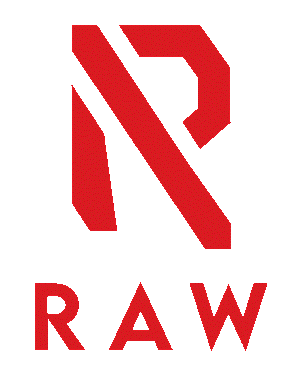
8 Responses